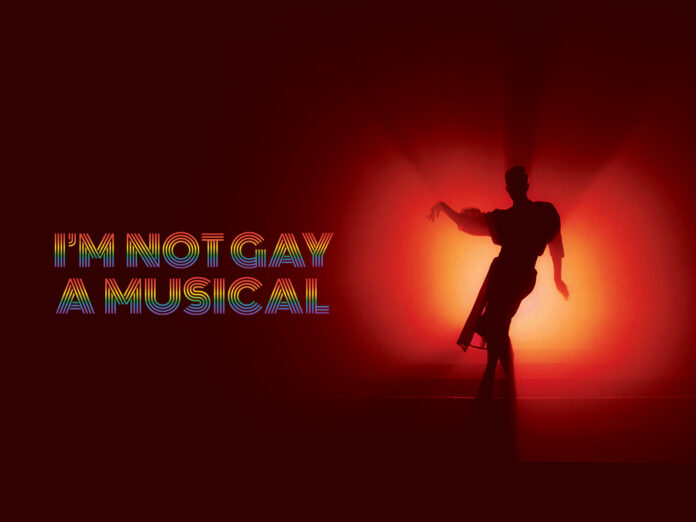A queer mishmash of ideas, characters, songs, and dance, the cringe-inducing film “I’m Not Gay: A Musical” almost has to be seen to be disbelieved.
Written and directed by Scott L. Semer (his debut feature), the film, which is now available on demand, is stagey and overly stylish. Semer alternates between arty black and white and sepia-toned color, frequently employs split screens, and includes several sequences shot with backlighting that more often than not silhouette the characters and obscure their expressions. It is as if Semer favors visual gimmicks to insist this was a film and not a theatrical experience.
But “I’m Not Gay: A Musical,” if it worked — and to be clear, it does not — would have worked better on the stage. The cast of performers are theater veterans emoting for the cheap seats. The sets are so nondescript there is no real sense of place; this film could have been set anywhere as it unfolds mostly in large open spaces so the cast have room to sing and dance. Not one, but three different musical numbers take place on a fire escape for no apparent reason.
The opening sequence features MMA fighters Misha (out actor Sydney James Harcourt, from “Hamilton”) and Frank Diamond (Yurel Echezarreta) in a cage match. Semer films this more like a ballet than a battle. The mat resembles a Jackson Pollock painting, and the athleticism is more like acrobatics. That cues the suspension of disbelief required for the next 90+ minutes, but too much of “I’m Not Gay: A Musical” feels unrealistic and unbelievable.
The story begins in earnest when Vera (Adrienne Walker) is dropping off Misha’s teenage daughter, Brooklyn (Gracie Bryant). Misha tries to have sex with his ex, but she warns him “no anal,” to which Misha insists, “I’m not gay!” One could get quite sloshed if they take a drink every time Misha forcefully utters the title phrase.
The acting in this early scene is wooden and the dialogue is clunky, but once the film shifts gears and Misha belts out the anthem, “The Mess Inside,” the film briefly sputters to life. Harcourt has a terrific voice, which sells this number, and the songs are arguably the best thing in this musical film, which has a strange fascination with pancakes. There are stacks of the breakfast food in several scenes, which is weird. Apparently, Misha has an issue with syrup being poured on them before they are served. If that is a metaphor, it does not make much sense.
After Misha repeatedly self-harms, he is told by his doctor (Gene Gabriel) to see transgender psychiatrist Dr. Maxine Caspar (Alan Mingo Jr.) on Fire Island if he wants a prescription for pain pills. Once in the gay mecca, Misha falls in love with the house he is renting. However, the seller (George Dvorsky), will only let him buy it if Misha is gay. So, in an offensive subplot, Misha pretends to be gay to convince the neighbors so he can buy his dream house.
The neighbors are a trio of gay men. Rush (Brad Bradley), who is nicknamed for Rush Limbaugh because, “he has a few Republican ideas” — such is the film’s idea of wit — Pablo (Manuel Herrera), a bathing suit designer, and his quasi-boyfriend known as Mr. Fahrenheit (Nick Silverio). The trio of gay men want Misha to help them win a dance contest. Cue a medley of gay show tunes including a painful “Singing in the Rain” parody. At least they are performed with gusto. To the film’s dubious credit, no matter how bad the material is, the performers give it their all, which is more than this production deserves.
Alas, Misha, who was a dancer — until a shameful incident from his past broke his spirit and he became an MMA fighter — is reluctant to help. He also refuses to teach Brooklyn how to pirouette. But his wise-beyond-her years daughter does instruct Misha about how to be gay through a song (remember, it’s a musical!) with an unsubtle lyric about “Jocks and twinks with daddy kinks, and cubs and otters, wolves and bears.” Brooklyn also tells Rush that her father likes him, which eventually leads to a kiss, and a rebuff because, well, Misha is not gay.
Additionally, “I’m Not Gay: A Musical” features Misha’s therapy scenes with Maxi (as Dr. Caspar is known), which include snippets of psychobabble as Misha comes to terms with his big dark secret from his past. (Astute viewers can easily guess what that is.) And Misha is taunted by his gay MMA rival, Frank Diamond, who is also competing against Misha’s neighbors in the dance contest.
The supporting characters, including Brooklyn, Vera, and Maxi each get a moment in the spotlight, which is perhaps nice, but Semer has a spotlight blinding viewers for the last 15 minutes of the film. Not one but two music and dance sequences are shot as if the camera was aimed at bright headlights. That one song contains a lyric about “finding the light” makes it even more excruciating. Semer also uses blackouts and edits in ways that do not make it any easier on the eyes. But then again, “I’m Not Gay: A Musical” is not a film worth watching.
